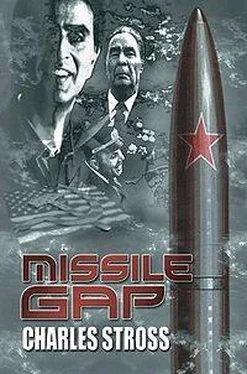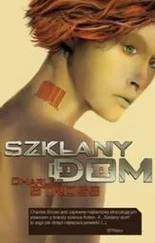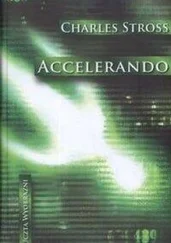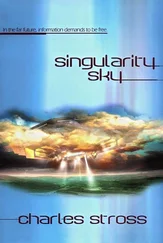"I can neither confirm nor deny that," says Gregor.
Sagan sighs. "Okay, play it your way." He closes his menu. "Ready to order?"
"I believe so." Gregor looks at him. "The spaghetti al' polpette is really good here," he adds.
"Really?" Sagan smiles. "Then I'll try it."
They order, and Gregor waits for the waiter to depart before he continues. "Suppose there's an alien race out there. More than one. You know about the multiple copies of Earth. The uninhabited ones. We've been here before. Now let's see…suppose the aliens aren't like us. Some of them are recognizable, tribal primates who use tools made out of metal, sea-dwelling ensemble entities who communicate by ultrasound. But others — most of them — are social insects who use amazingly advanced biological engineering to grow what they need. There's some evidence that they've colonized some of the empty Earths. They're aggressive and territorial and they're so different that…well, for one thing we think they don't actually have conscious minds except when they need them. They control their own genetic code and build living organisms tailored to whatever tasks they want carrying out. There's no evidence that they want to talk to us, and some evidence that they may have emptied some of those empty Earths of their human population. And because of their, um, decentralized ecosystem and biological engineering, conventional policy solutions won't work. The military ones, I mean."
Gregor watches Sagan's face intently as he describes the scenario. There is a slight cooling of the exobiologist's cheeks as his peripheral arteries contract with shock: his pupils dilate and his respiration rate increases. Sour pheromones begin to diffuse from his sweat ducts and organs in Gregor's nasal sinuses respond to them.
"You're kidding?" Sagan half-asks. He sounds disappointed about something.
"I wish I was." Gregor generates a faint smile and exhales breath laden with oxytocin and other peptide messengers fine-tuned to human metabolism. In the kitchen, the temporary chef who is standing in for the regular one — off sick, due to a bout of food poisoning — will be preparing Sagan's dish. Humans are creatures of habit: once his meal arrives the astronomer will eat it, taking solace in good food. (Such a shame about the chef.) "They're not like us. SETI assumes that NHIs are conscious and welcome communication with humans and, in fact, that humans aren't atypical. But let's suppose that humans are atypical. The human species has only been around for about a third of a million years, and has only been making metal tools and building settlements for ten thousand. What if the default for sapient species is measured in the millions of years? And they develop strong defense mechanisms to prevent other species moving into their territory?"
"That's incredibly depressing," Sagan admits after a minute's contemplation. "I'm not sure I believe it without seeing some more evidence. That's why we wanted to use the Arecibo dish to send a message, you know. The other disks are far enough away that we're safe, whatever they send back: they can't possibly throw missiles at us, not with a surface escape velocity of twenty thousand miles per second, and if they send unpleasant messages we can stick our fingers in our ears."
The waiter arrives, and slides his entree in front of Sagan.
"Why do you say that?" asks Gregor.
"Well, for one thing, it doesn't explain the disk. We couldn't make anything like it — I suppose I was hoping we'd have some idea of who did? But from what you're telling me, insect hives with advanced biotechnology…that doesn't sound plausible."
"We have some information on that." Gregor smiles reassuringly. "For the time being, the important thing to recognize is that the species who are on the disk are roughly equivalent to ourselves in technological and scientific understanding. Give or take a couple of hundred years."
"Oh." Sagan perks up a bit.
"Yes," Gregor continues. "We have some information — I can't describe our sources — but anyway. You've seen the changes to the structure of the galaxy we remember. How would you characterize that?"
"Hmm." Sagan is busy with a mouthful of delicious tetrodotoxin-laced meatballs. "It's clearly a Kardashev type-III civilization, harnessing the energy of an entire galaxy. What else?"
Gregor smiles. "Ah, those Russians, obsessed with coal and steel production! This is the information age, Dr. Sagan. What would the informational resources of a galaxy look like, if they were put to use? And to what use would an unimaginably advanced civilization put them?"
Sagan looks blank for a moment, his fork pausing halfway to his mouth, laden with a deadly promise. "I don't see — ah!" He smiles, finishes his forkful, and nods. "Do I take it that we're living in a nature reserve? Or perhaps an archaeology experiment?"
Gregor shrugs. "Humans are time-binding animals," he explains. "So are all the other tool-using sentient species we have been able to characterize; it appears to be the one common factor, they like to understand their past as a guide to their future. We have sources that have…think of a game of Chinese whispers? The belief that is most widely held is that the disk was made by the agencies we see at work restructuring the galaxy, to house their, ah, experiments in ontology. To view their own deep past, before they became whatever they are, and to decide whether the path through which they emerged was inevitable or a low probability outcome. The reverse face of the Drake equation, if you like."
Sagan shivers. "Are you telling me we're just…memories? Echoes from the past, reconstituted and replayed some unimaginable time in the future? That this entire monstrous joke of a cosmological experiment is just a sideshow?"
"Yes, Dr. Sagan," Gregor says soothingly. "After all, the disk is not so large compared to an entire galaxy, don't you think? And I would not say the sideshow is unimportant. Do you ever think about your own childhood? And wonder whether the you that sits here in front of me today was the inevitable product of your upbringing? Or could you have become someone completely different — an airline pilot, for example, or a banker? Alternatively, could someone else have become you? What set of circumstances combine to produce an astronomer and exobiologist? Why should a God not harbour the same curiosity?"
"So you're saying it's introspection, with a purpose. The galactic civilization wants to see its own birth."
"The galactic hive mind," Gregor soothes, amused at how easy it is to deal with Sagan. "Remember, information is key. Why should human-level intelligences be the highest level?" All the while he continues to breathe oxytocin and other peptide neurotransmitters across the table towards Sagan. "Don't let such speculations ruin your meal," he adds, phrasing it as an observation rather than an implicit command.
Sagan nods and returns to using his utensils. "That's very thought-provoking," he says, as he gratefully raises the first mouthful to his lips. "If this is based on hard intelligence it…well, I'm worried. Even if it's inference, I have to do some thinking about this. I hadn't really been thinking along these lines."
"I'm sure if there's an alien menace we'll defeat it," Gregor assures him as he masticates and swallows the neurotoxin-laced meatball in tomato sauce. And just for the moment, he is content to relax in the luxury of truth: "Just leave everything to me and I'll see that your concerns are communicated to the right people. Then we'll do something about your dish and everything will work out for the best."
Chapter Fourteen: Poor Prognosis
Maddy visits John regularly in hospital. At first it's a combination of natural compassion and edgy guilt; John is pretty much alone on this continent of lies, being both socially and occupationally isolated, and Maddy can convince herself that she's helping him feel in touch, motivating him to recover. Later on it's a necessity of work — she's keeping the lab going, even feeding the squirming white horror in the earth-filled glass jar, in John's absence — and partly boredom. It's not as if Bob's at home much. His work assignments frequently take him to new construction sites up and down the coast. When he is home they frequently argue into the small hours, picking at the scabs on their relationship with the sullen pinch-faced resentment of a couple fifty years gone in despair at the wrongness of their shared direction. So she escapes by visiting John and tells herself that she's doing it to keep his spirits up as he learns to use his prostheses.
Читать дальше












